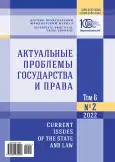On John Rawls’ theory of justice
- Authors: SOLOVYEVA V.V.1
-
Affiliations:
- Lipetsk Branch of the Russian Presidential Academy of National Economy and Public Administration
- Issue: Vol 6, No 2 (2022)
- Pages: 167-177
- Section: General Theory and History of Law and the State
- URL: https://journal-vniispk.ru/2587-9340/article/view/303760
- ID: 303760
Cite item
Abstract
The political processes that took place in the world after the Second World War required a new philosophical understanding, since the utilitarian approach, which dominated the Anglo-American political tradition for a long time, could not fully fulfill this task. John Rawls, from whom the revival of political philosophy began, proposed his own version of the solution of the accumulated theoretical problems, which met the social and political demands of his time. Moreover, Rawls was practically the first to put justice at the center of political and philosophical thought. The problem of justice has been the subject of attention of philosophers since Antiquity, however, the doctrine of justice was the components of social and moral teachings in general, while traditionally the main issue for political philosophy was the question of power, its political organization and legitimacy. The purpose of the article is a scientific analysis of the political and philosophical legacy of John Rawls. Rawls demonstrated that the political organization of power is derived from how we understand ethical norms and what norms (rules) we are guided by in social interaction, therefore the main issue of political philosophy is not the question of power, but the question of justice. In addition, he was convinced that political freedom is closely related to equality. The methodological basis included the dialectical method, a group of general scientific methods of cognition – the method of analysis and synthesis, the structural method, as well as private scientific ones - formal legal and comparative legal methods. It is concluded that Rawls’ theory of justice had a decisive influence on the political philosophy of the twentieth century, the development of which largely took place on the basis of criticism or reception of his ideas. Today we are witnessing the beginning of a break with the tradition of which Rawls is the spokesman and which assumes that the political is based on the possibility of consensus and ethical agreement. However, the current development of political philosophy is also closely related to the rethinking of Rawls’ legacy, which we see, in particular, in the development of so-called “imperfect” political theories.
Keywords
About the authors
Viktoriya V. SOLOVYEVA
Lipetsk Branch of the Russian Presidential Academy of National Economy and Public Administration
Author for correspondence.
Email: viktoriya-solove@list.ru
ORCID iD: 0000-0002-3843-3675
Doctor of History, Professor, Professor of the Criminal Law, Procedure and Criminalistics Department
Russian Federation, 3 Internatsionalnaya St., Lipetsk 398050, Russian FederationReferences
- Aristotle. Sobraniye sochineniy: v 4 t. [Collected Works: in 4 vols.]. Moscow, Mysl’ Publ., 1983, vol. 4, 832 p. (In Russian).
- Sutor B. Malaya politicheskaya etika [Minor political ethics]. Politicheskaya i ekonomicheskaya etika [Political and Economic Ethics]. Moscow, FAIR-PRESS, 2001, 365 p. (In Russian).
- Hume D. Traktat o chelovecheskoy prirode. Kn. III. Ch. 2. Gl. 2 [Treatise on human nature. Bk III, pt 2, ch. 2]. In: Hume D. Sochineniya: v 2 t. T. 1 [Works: in 2 vols. Vol. 1]. Moscow, Mysl’ Publ., 1996, 696 p. (In Russian).
- Rawls J. Teoriya spravedlivosti [Theory of Justice]. Novosibirsk, State University Publ., 1995, 500 p. (In Rus-sian).
- Makintayr A. Posle dobrodeteli: Issledovaniya teorii morali [After Virtue: Studies in the Theory of Morality]. Moscow, Akademicheskiy Proyekt Publ., Ekaterinburg, Delovaya kniga Publ., 2000, 384 p. (In Russian).
- Litvinenko N.S. Kontseptsiya spravedlivosti Dzhona Rolza [Concept of justice by John Rawls]. Logos, 2006, no. 1, pp. 26-34. (In Russian).
- Maydanyuk I.Z. Eshche raz o spravedlivosti idey Dzhona Rolza [Once again about the justice of John Rawls’s ideas]. Aktual’nyye voprosy obshchestvennykh nauk: sotsiologiya, politologiya, filosofiya [Topical Issues of Social Sciences: Sociology, Political Science, Philosophy], 2013, no. 31, pp. 46-52. (In Russian).
Supplementary files








